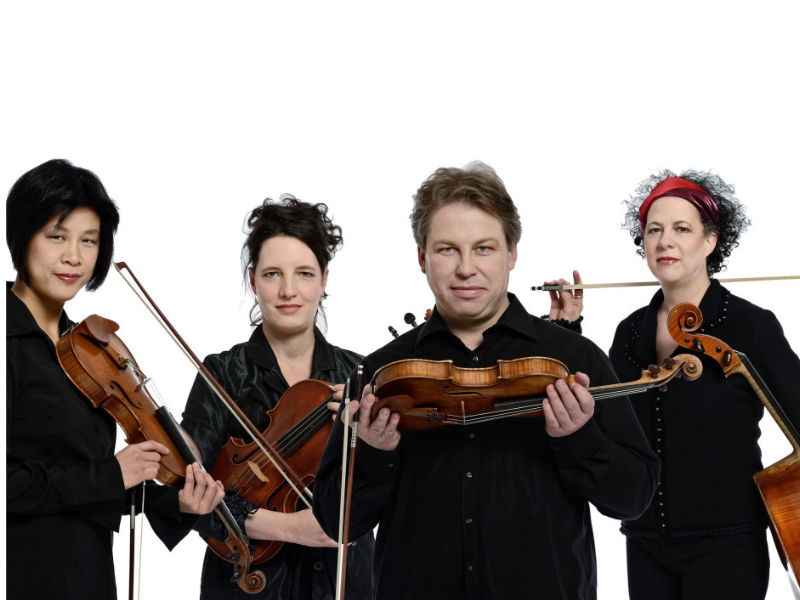Bozzini spila Radigue
Bozzini
Harpa Norðurljós
22:00
25. janúar
Montréal-based Quatuor Bozzini performs French pioneering electronic music composer Éliane Radigue‘s Occam Delta XV, written for the quartet in 2018. Coinciding with the composer’s 91st birthday, this Icelandic premiere will also be the occasion for the launch of the album, released on Collection QB.
I was very honoured to receive this request from Quatuor Bozzini, whose immense talent I already knew. The first meeting was very warm, friendly and familiar, like a reunion of old friends after a long separation. —Éliane Radigue
Thus began the collaboration between Quatuor Bozzini and Éliane Radigue. In the hospitable atmosphere of her apartment, the composer conveyed the intricacies of her sound to QB. Her entire career, Radigue has been dedicated to building a body of work in which, from long sustained tones, microbeats between frequencies emerge. Radigue transmitted Occam Delta XV (2018) to QB — the dedicatee of the piece — through an oral composition process which, given Radigue’s experience with electronic instruments, was the most natural way of communicating.
Éliane Radigue (b. January 24, 1932) is regarded as one of the most innovative and influential composers working today. Up until 2000, she was known for work produced electronically. Since that time, she has composed mostly for acoustic instruments, and from 2011, she has composed exclusively in collaboration with individual performers, working with the musicians’ personal techniques and relationship to their instruments, using solely oral and aural means of transmission rather than written scores. The resulting body of work is the series Occam Ocean, some 80 solos and chamber pieces, written for some of the leading exponents of experimental music. Occam Delta XV forms part of this sequence and began with a request to the composer from Quatuor Bozzini, already known for its interpretations of experimental works.
Water and Ockham’s Razor
“Simplest is always the best!”
Here is how Ockham’s Razor, a problem-solving principle also known as the ‘law of parsimony,’ is presented by composer Éliane Radigue. The idea is attributed to medieval philosopher William of Ockham (XIV century), and can be formulated as such: “Pluralitas non est ponenda sine necessitate; multiples should not be used without necessity.
Placed at the core of Radigue’s instrumental project Occam Océan, this principle becomes at once a performance guide for musicians, and a key structural element of the piece. During performance the razor is used as follows: if a section of the piece turns out to be less intense than what was initially planned, it is best for performers to skip right to the next section rather than to relentlessly try to “fix” something that is not picking up. Reversely, if a section sounds marvellous, musicians are encouraged to sustain it as long as possible, for the sake of pleasure… In this way, each section of the piece is partly determined by that which—in the midst of performance—seems to be the simplest solution. For we are not talking here of scored music, but rather of an “intuitive compositional process,” akin to “oral transmission of ancient traditional music” (Sonami, 2017). During their first meeting with Radigue, musicians choose a water-related image (hence the second part of the title). This image is very personal to each musician, and behaves like a scaffolding in the construction of the piece, somewhat replacing the written score. Once the piece is well structured, the image may be “left behind, in the drawer,” like a score when one knows a piece of music by heart. Each piece is thus tailored for each musician, and each musician has her and his own solo, named Occam*.
By combining solos, Occam River duos are formed, Occam Delta for trios and quartets,
Hexa for quintets, and so forth up to Occam Océan for large orchestra. Up to this day, there are 23 solos, and already more than 50 pieces created through these combinations. As Radigue puts it, it is but the beginning of a cycle creating an oeuvre “by nature unfinished, because [it is] unfinishable”… And this pleases her very much.
* Since all rules have their exceptions, not only is the Bozzini Quartet the only string quartet of the Occam project, but also the only Occam Delta not to be produced through the combination of solos and duos.
- Emanuelle Majeau-Bettez


